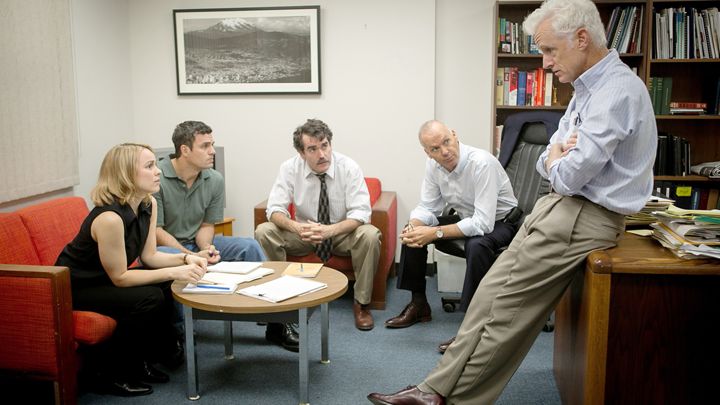As Spotlight begins, the lyrical piano melodies composed by Howard Shore are the first thing the audience experiences. Likely aware of the subject of Tom McCarthy’s Oscar-nominated drama, we’re immediately being provoked to understand the wells of emotion that are uncovered as the film unfolds. We’re in Boston, 2001, and the city’s Globe newspaper is about to discover the astonishing depths of long-rumoured cover-ups of priest paedophilia in the Catholic Church. ‘Spotlight’ is almost a misnomer for the small team of investigative journalists dedicated to the story; their research goes beyond the immediate glare of the light, coaxed by new boss Marty Baron (Liev Schreiber) into probing deeper and into more dangerous territory. In an era where true crime stories like Serial and Making a Murderer are fascinating audiences, Spotlight’s detailed portrait of the investigative process feels very current.
McCarthy’s more provocative thematic line of the damaging intersections of various American institutions – church, law and press being those prominent here – is even more timeless, and the writer-director (scripting with West Wing alum Josh Singer) brings his patented controlled naturalism to his largest canvas yet. He seems compelled to present occasionally blunt symbolic imagery of churches leering over practically every exterior shot, their bells echoing on the soundtrack, but he keeps his hand mostly steady, delicately placing his camera at a respectful distance to his actors so we always see them in the context of their surroundings. He eschews dramatic image choreography for graceful fluidity, allowing the journalistic process and the gravitas of the subject to make his film quietly potent.

Unlike the pairing at the centre of the great of the journalistic sub-genre, All the President’s Men, the Spotlight team don’t need to fight for their legitimacy; the opening scenes present the Globe’s big newsroom and then draw us into the cloistered office of the four Spotlight members. Already there and noticeably avoiding the company’s farewell to a retiree is Mike Rezendes (Mark Ruffalo); of the team, Mike proves to be the loneliest and perhaps resultantly the most fanatically dedicated to the cause, and Ruffalo’s intense performance is an effective dramatisation of a man who feels compelled to overstate his commitment. Unlike the majority of the cast, who favour subdued interiority in their approach, Ruffalo’s performance is largely external, physically expressive and emotionally feverish. It maybe doesn’t seem as graceful as Schreiber’s measured intelligence, Stanley Tucci’s reluctant conflict or Rachel McAdams’ watchful generosity, but it serves as a motor for a film that could easily have indulged in more of its few dry montages of looking through clippings and knocking on doors.
It’s in the continual interactions of the cast that Spotlight finds its real richness, consistently challenging our perceptions of the structures of power in the intersecting systems of church, law and press have hidden this devastating reality for so long. Editor Tom McArdle navigates these interwoven threads with superb confidence, shifting between immersive two-shot conversations and group discussions without the intimacy of the film shifting with it. The aforementioned montages serve as restful punctuation, but also offer a glimpse of the wider reach of the investigative process, as the reporters visit their library and archives. What Spotlight quietly pulls off is a subtle but tangible sense of place and the ripples within the community; the team are digging in the foundations of a centuries-old infrastructure that has nestled firmly in people’s souls, and McCarthy and Singer’s script delicately delineates the crisis of faith being dug up.

When McAdams’ Sacha Pfeiffer knocks on a door and finds herself talking to a former priest who quite openly admits to molesting children, she stumbles on her words, struggling to adjust to such a naive, straightforward confession. You see Sacha’s journalistic instincts adjusting as she composes herself, and the audience might find themselves in a similar position as they are confronted with a subject the world seems to have largely moved on from. Despite the enormous reach of the uncovered scandals provoked by this Pulitzer Prize-winning investigation, we are reminded by this bracing film of how these things linger, overlooked, and how brave we must be to unveil them and work towards resolving their existence. This light needs to shine and Spotlight is the switch.
Spotlight is in cinemas now.




